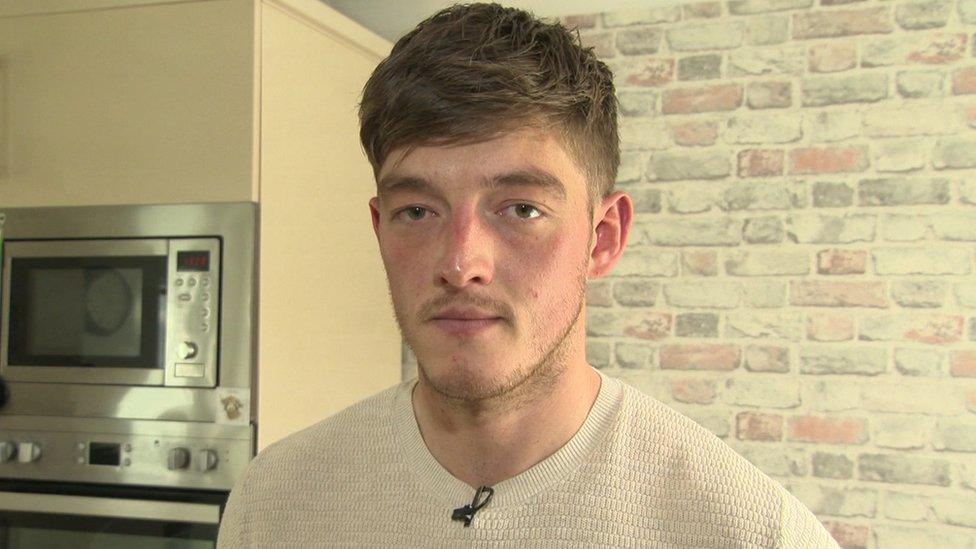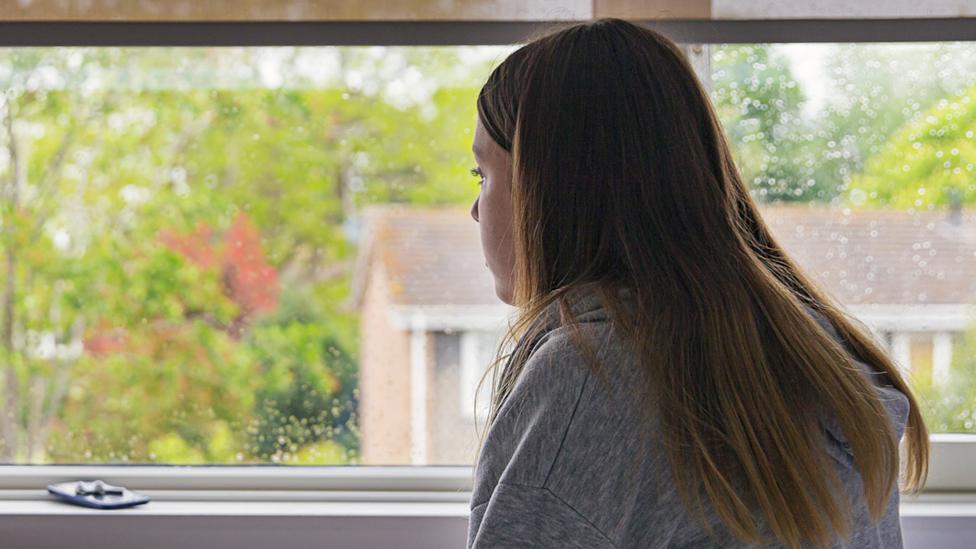'My mum saved my life during anorexia treatment', Kent woman says
- Published

Millie Gaskin at the time of her treatment for anorexia nervosa after being unwell as a student at university
A woman says her mum saved her life by supporting her during treatment for the eating disorder anorexia nervosa.
Millie Gaskin, 26, from Otford in Kent, says her mother Caroline was quick in getting help from the NHS after she fell ill at university.
She said: "I struggle to imagine how people manage to do it if they don't have someone fighting their corner."
Eating disorder charity Beat says demand for its service has grown since the Covid pandemic.
Millie, who was 20 years-old when she was diagnosed, says she is speaking out about her recovery to give hope to other patients.
She says early treatment is crucial: "The earlier they can access treatment, then the less ingrained the eating disorder will hopefully be.
"I know for me that when I was really struggling, I wanted to hear stories from people who were doing something positive with their recovery."
'Terrified of food'
Millie said her mother was the first one to notice something was wrong.
"I was going home very other weekend and she would say 'you're not eating very much'. I used to love her cooking, but then I would be terrified of everything she was cooking me.
"She took me to the GP, but my BMI was on the cusp of healthy, then she took me back two weeks later when I lost more weight and they eventually referred me to the eating disorders unit."
Millie said at one stage her condition had worsened and she faced the prospect of being sent to hospital.
"I was so adamant I wasn't going to go and I was given one more week and I just ate and that was the start of getting better."

Millie with her mother Caroline, who she says was instrumental in asking for help from the NHS
After two years of being a healthy weight, Millie said she was still struggling and was re-referred for treatment.
"My mum very much fought for me."
She was referred to the Speaks study, external - Specialist Psychotherapy with Emotion for Anorexia in Kent and Sussex.
Dr Anna Oldershaw, a reader in clinical psychology at Canterbury Christchurch University who was involved in the study said: "In our trial the average illness duration was nine years and 80% of people had had a previous therapy.
"They'd been through the system, and it hadn't worked for them in some way and they had remained quite stuck."
Hospital admissions rising
The latest NHS figures suggest in England there were 28,371 hospital admissions linked to eating disorders in 2022-23 up from 18,633 in 2019-20.
In Kent, referrals to the eating disorders service have risen from 870 in 2018-19 to 1,997 in 2022-23, while in Surrey referrals have risen from 545 to 857 over the same time period.
The eating disorders charity, Beat, said it provided 96,473 support sessions in the year to March 2023, compared with 41,677 between April 2019 and March 2020.

Jonathan Kelly from Beat says the pandemic had an impact on the number of people needing their support services
Jonathan Kelly, policy advisor at Beat, said: "We know the pandemic caused a lot of anxiety in people, people who maybe were already in some cases dealing with an eating disorder or those that were at greater risk of developing one.
"It caused heightened anxiety because of these changes in routines that people had, and also in many cases isolation and being unable to see friends and family."

If you've been affected by eating disorders, help and support is available via the BBC Action Line.

NHS Kent and Medway says it is investing £6m a year in a specialist eating disorders service - almost double what it was five years ago.
It says it aims to see urgent referrals within one week.
An early intervention service called Freed (First episode Rapid Early intervention for Eating Disorders), external has been set up in Kent, Surrey and Sussex to provide rapid treatment for 16 to 25 year-olds.
Professor Ulrike Schmidt, a consultant psychiatrist at the South London and Maudsley Hospital, where the programme was developed, said: "The team makes rapid contact with the patient and treatment starts no later than four weeks from referral.
"They're given outpatient psychological therapies. This is the peak period of onset for eating disorders," she added.

Analysis
By Mark Norman, BBC South East health correspondent
The numbers speak for themselves.
In the UK, it is estimated that there are 1.25 million people with eating disorders, and a disproportionate number are below the age of 25.
The latest figures we have show almost 30,000 admissions to hospital due to eating disorders in a single year, almost half under the age of 25.
Anorexia is known to have the highest mortality rate of any psychiatric condition.
If I quote the Children's Commissioner: '"It is vital that children and young people have access to effective and potentially life-saving treatment in a timely manner."
There are ambitious treatment targets for the NHS to hit, but in most regions they are not getting close and the impact of that is devastating on those affected and their families.

A Department of Health and Social Care spokesperson said it was increasing the number of health care staff able to treat people with the condition, and was investing an additional £54 million to expand children and young people's services across the country
"We are also investing up to an additional £2.3 billion a year into NHS mental health services by the end of 2023/24 compared to 2018/19, and increasing the number of mental health support teams in schools to reach at least 50% of pupils in England by the end of March 2025."

Follow BBC South East on Facebook, external, on X, external, and on Instagram, external. Send your story ideas to southeasttoday@bbc.co.uk or WhatsApp us on 08081 002250.
Related topics
- Published21 June 2023

- Published10 June 2023

- Published22 July 2021
